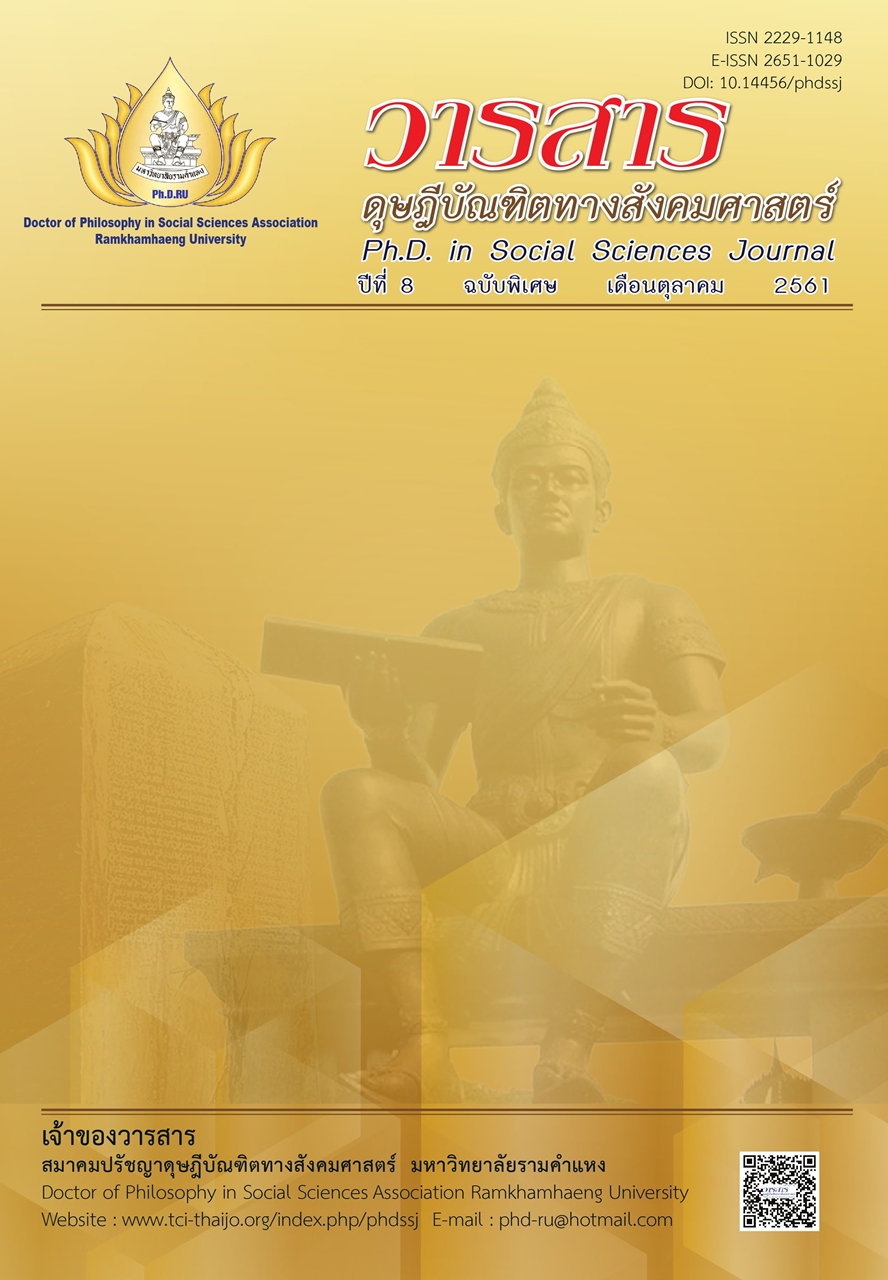The Living Performance in Accordance with The Philosophy of Sufficiency Economy of The People in Thawi Watthana District at Bangkok
Main Article Content
Abstract
This research aims to: 1) To study the level of living according to Sufficiency Economy Philosophy of Thaveewattana people. Bangkok 2) To study the general condition of Thawi Watthana people. Quantitative research Using survey research. The data were collected by questionnaire. The population was 384 persons. The statistics used for data analysis were percentage, frequency, mean, and standard deviation. Correlation coefficient.
The research found that most of respondents were female, single graduated Bachelor degree or equivalent. There were members 3-4 people in family with average income per month 15,001- 25,000 baht and the average monthly expenditures lower than 15,000 baht. The living performance in accordance with the philosophy of sufficiency economy of the people in Thawi Watthana District at Bangkok in overall was in high level ( = 3.70, SD = 0.42) When considering in each aspects which could sort from high to low as follows. Moral conditions aspect (
= 4.09, SD = 0.48) rationality aspect (
= 3.72, SD = 0.54) , moderation aspect (
= 3.68, SD = 0.55), knowledge condition (
= 3.60, SD = 0.47) and immunity system aspect (
= 3.42, SD = 0.49), respectively. Personal factors in education level were positively correlated with the living performance in accordance with the philosophy of sufficiency economy in the aspect of knowledge condition in high level (r = 0.77) and moral condition in high level (r = .71). Personal income per month and average monthly expenses were positively correlated with the way of living according to Sufficiency Economy Philosophy in high level (r = .75) and (r = 0.73), respectively
Article Details
Academic articles, research articles, and book reviews in the Ph.D. in Social Sciences Journal are author’s opinions, and not the publisher’s, and is not the responsibility of the Ph.D. in Social Sciences Journal Philosophy Association, Ramkhamhaeng University. (In the case that research is done on human, the researcher has to be trained in Ethics for Doing Research on Human Training and has to produce the evidence of the training).
References
Chumkasean, C. (2007). Living by philosophy of sufficience economic and indebtedness of the navy personnel residence in Bangkok. Chonburi: Burapa University. [In Thai]
Cronbach, L. J. (1970). Essentials of psychological testing. New York: Harper & Row.
Isarangkun Na Ayuthaya, C. (2009). Follow the father of sufficiency... to sustainable development. Bangkok: Crown Property Bureau. [In Thai]
Karnsa, K. (2007). Relationship between sufficiency economy the quality of life of people in Kok Kung district, Muang Suang. Roi Ed. Nonthaburi: Sukhothai Thammathirat Open University. [In Thai]
Keatkrai, A. (2008). Application of sufficiency economy philosophy in people’s daily life of Klong Phra Udom subdistrict, Pakkred district, Nonthaburi province. Bangkok: Phranakhon Rajabhat University. [In Thai]
Krejcie, R. V., & Morgan, D. W. (1970). Determining sample size for research activities. Education and Psychological Measurement, 30, 607-610.
Office of the National Economics and Social Development Board. (2007). The philosophy of sufficiency economy. Bangkok: Century. [In Thai]
Rattanaborworn, J., & Tankaew, A. (2009). Behavior of students Ubon Ratchathani Rajabhat University: Case of applying sufficiency economy philosophy in life. Ubon Ratchathani: Ubon Ratchathani Rajabhat University. [In Thai]
Sufficiency Economy. (n. d.). Buddhism and sufficient economy. Retrieved January 31, 2018, from https://sites.google.com/site/sirimapt/bi-ngan-thi2-sersthkic-phx- pheiyng [In Thai]
Tantivejkul, S. (1999). Living in sufficiency economy by royal initiative in development day. Bangkok: Department of Community Development. [In Thai]
Wasi, P. (1999). Sufficiency economy and civil society: A way to reinvent economic society. Bangkok: Pimpaluk. [In Thai]


